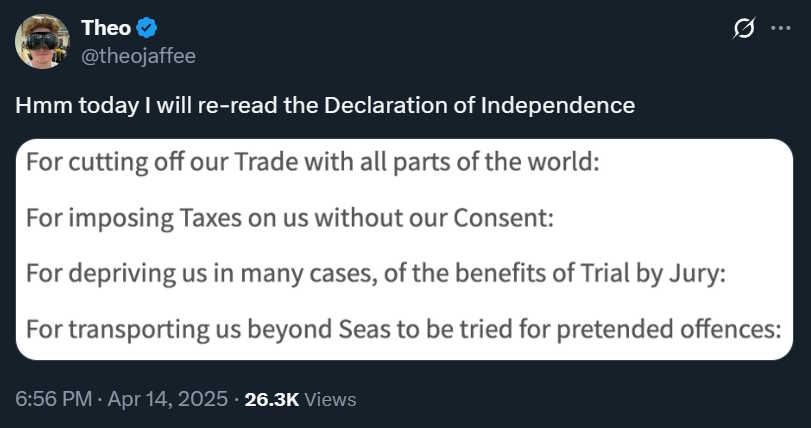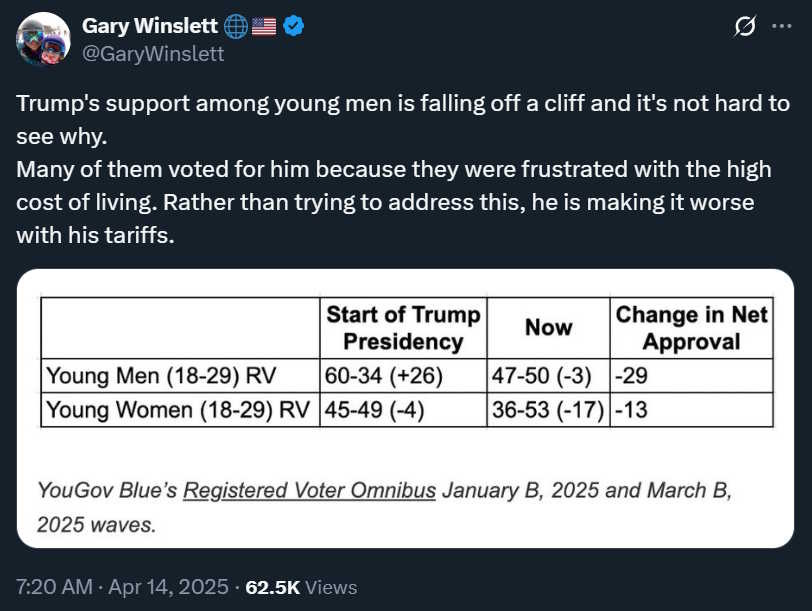The authoritarian takeover attempt is here
Sadly, we were warned.
Even as tariffs begin to send the U.S. economy down the tubes, the Trump administration is doing some other things that are not as flamboyantly stupid, but which could have even longer-reaching and darker consequences. The other day, the Trump administration arrested an innocent Salvadoran man named Kilmar Abrego Garcia and sent him to a prison in El Salvador with no trial or even any accusation of a crime. The administration later admitted that his arrest had been an error — Garcia had been granted court protection against deportation, but Trump’s people grabbed him anyway.
A few days ago, the Supreme Court unanimously upheld a lower court’s order that the Trump administration “facilitate” the return of Abrego Garcia to the U.S. Trump initially said he would respect the Supreme Court’s decision. But then today, Trump reversed course, declaring that his administration doesn’t have the power to return Abrego Garcia. Bukele, meeting with Trump in the Oval Office, argued that his government also doesn’t have the power to return Abrego Garcia; given that Bukele has already returned several people to the U.S., it’s anyone’s guess as to whether Bukele is simply lying, or whether Abrego Garcia is already dead.
This should scare you, for a number of reasons.
First, there’s the obvious: Trump is going around arresting innocent people, and sending them to foreign torture-dungeons, apparently for the rest of their lives. Bloomberg reports that about 90% of these deportees had no criminal records in the U.S., and most have not been charged with any crime:

Some were arrested simply because they had (non-gang) tattoos. Others didn’t even have any tattoos, and were arrested for no apparent reason.
It’s not clear why the Trump administration is doing this. Perhaps it’s to scare immigrants into leaving the country by making an example of a few. Perhaps it’s to simply assert power, or to test the boundaries of what they can get away with. Maybe they’ve really convinced themselves that all of the people they arrested are gang members. Who knows. But what’s clear is that this is brutal and lawless behavior — the kind of arbitrary arrest and punishment that’s common in authoritarian regimes.
The second thing that should scare you is the lawlessness. The Trump administration insists it didn’t defy the Supreme Court, arguing that simply removing any barriers to Abrego Garcia’s return means that they’re complying with the court order to “facilitate” that return. Trump’s people have also argued that the courts have no right to interfere in the executive branch’s conduct of foreign policy. And on top of that, they’ve declared that their deal with Bukele is classified.
In practice, the administration is arguing that as soon as they arrest someone and ship them overseas, U.S. courts have no right to order their return — ever. That means that Trump could grab you, or me, or anyone else off the street and put us on a plane to El Salvador, and then argue that no U.S. court has the right to order us back, because once we’re on foreign soil it’s the domain of foreign policy. If so, it means that due process and the rule of law in America are effectively dead; the President can simply do anything to anyone, for any reason.
A more clearly worded SCOTUS ruling would help clarify whether Trump is, in fact, openly defying the Court. The recent ruling did order the lower court to have “due regard for the deference owed to the Executive Branch in the conduct of foreign affairs.” But this is starting to feel like a constitutional crisis.
The third reason the Abrego Garcia case should worry you is that the Trump administration probably intends to go much further. Kilmar Abrego Garcia isn’t an American citizen, but Trump has stated that he wants to start sending U.S. citizens to El Salvador too. Here are three relevant clips from his meeting with Bukele (clip 1, clip 2, clip 3):
Now put all of these things together. Since A) the Trump administration A) argues that anyone being imprisoned in a foreign country is beyond the reach of U.S. courts, B) Trump wants to send U.S. citizens to El Salvador, and C) Trump is arresting people who haven’t been accused of any crime, this means that Trump is asserting the power to unilaterally and arbitrarily send any American citizen to a Salvadoran prison for any reason.
That is the power of a dictator. A few weeks ago I wrote a post asking when, exactly, we could conclude that America had become a dictatorship:
It seems clear that if Trump actually does have the ability to arbitrarily send any American to an overseas prison with zero due process and zero oversight by any court of law, then we do, in fact, live in a dictatorship. It’s notable that immediately after complaining about tariffs, the Declaration of Independence complains about King George sending Americans overseas for “pretend offenses” without jury trial:
I guess some things never change.
In any case, it requires no great stretch of the imagination to realize that Trump would use this power to go after his domestic critics. Already, the administration has deported a Turkish PhD student for writing an op-ed criticizing a university for its stance on the Gaza war, even though there was no evidence that she had any ties to Hamas (or had done anything antisemitic). If the President can punish citizens for their opinions in similar ways, we’re in big trouble.
Already, Trump is trying to use government power to crack down on dissent:
President Donald Trump has a “hope” for his Federal Communications Commission: that the agency will punish CBS for airing “60 Minutes” reports he doesn’t like…Apparently angered by Sunday night’s “60 Minutes” telecast…Trump…said hopefully [FCC chair Brendan] Carr “will impose the maximum fines and punishment, which is substantial, for their unlawful and illegal behavior.”…Sunday night’s post is the latest example of Trump encouraging his appointees to apply government pressure against his critics. In recent months, Carr has flaunted his MAGA credentials and launched FCC investigations of several media outlets Trump has derided, including ABC and NBC.
That’s not the only example, either:
The Associated Press accused the White House of violating a court order after it was once again banned from an Oval Office event…On Monday, AP writer David Bauder reported that a reporter and photographer were barred from attending a news conference with President Donald Trump and El Salvador President Nayib Bukele…This decision came despite U.S. District Judge Trevor N. McFadden ruling last week that the White House had violated the Constitution by blocking the longtime publication’s access to press events.
Meanwhile, a Trump ally reportedly told CNN’s parent company that they could get back in Trump’s good graces and avoid future lawsuits by making a documentary about Melania Trump, or a TV show about Donald Trump, Jr. — either of which would involve paying the Trump family large amounts of money. This fits with a general pattern of extreme corruption in the Trump administration, but it’s also an attempt to use presidential power to turn the media into outlets for regime propaganda.
How much any of this will affect Trump’s popularity remains to be seen. On one hand, his approval rating continues to inch ever downward, and he appears to have very rapidly lost support among young men:
This poll was taken in March, before the “Liberation Day” tariff madness, so Trump’s authoritarianism may be a factor here.
But on the pessimistic side of things, immigration appears to be the one major issue where voters still like what Trump is doing:
The deportations of innocent people like Kilmar Abrego Garcia are probably seen as part of the immigration issue. The perception that America was being “invaded” by the asylum-seeking migrants that Biden let in was an important part of why Trump got elected, and it’s probably why Trump feels like he has a popular mandate to round up random Salvadorans and Venezuelans and ship them to overseas dungeons. Concerns over authoritarianism may eventually come to outweigh that wave of anti-immigration sentiment, but by then due process may have been eroded to the point where Trump is able to persecute his critics at will.
A few months ago, saying any of this would have drawn accusations of “Trump Derangement Syndrome” (and in fact, it will probably still draw a few). Trump’s failure to make America meaningfully more authoritarian in his first term made the possibility of a more successful attempt in his second term seem preposterous even to many outside his core MAGA support base. Even I thought there was a possibility — albeit a remote one — that Trump would mellow in his second term. Now, just a few months later, it’s that best-case scenario that seems risible. That’s how fast things have deteriorated here in America.
However, it’s worth noting that we’re not quite getting the worst-case scenario either — at least, not so far. In his first term, Trump’s approach was famously characterized as “malevolence tempered by incompetence” — he seemed to want to make America a more authoritarian nation, but didn’t seem to have competent personnel who could make that happen. All the competent people in his first administration — Steve Mnuchin, James Mattis, and so on — turned out to be forces for stability and liberalism, while more authoritarian cronies like Stephen Miller and Michael Flynn talked big but didn’t seem to do much.
The big worry, when Trump took office three months ago, was that in his second term his instincts would be just as authoritarian, but his competence would receive a massive boost from the alliance with Elon Musk and the Tech Right. Elon’s government-slashing DOGE blitz in the early days of the administration seemed to confirm that Trump 2.0 had the technical chops that Trump 1.0 had lacked.
In the past few weeks, though, that narrative has looked less likely. Elon has begun to fade a bit from public view, after failing to influence a Wisconsin election, and after getting in a highly public feud with Peter Navarro over tariffs. Trump’s people have begun to leak some very negative comments about Elon, and DOGE has quietly admitted that it has saved the government little if any money so far.
Although it’s still early days, as of now I think it’s looking less likely that Musk and the Tech Right will add that critical missing element of competence to the Trump team. Elon is incredible at building businesses, but Trump commands the nation’s largest personality cult, and at the MAGA movement probably has room for only one Alpha Dog.
Which means that Trump 2.0 is still likely to struggle to get big things done, despite having a few more years to prepare. The sad spectacle of the flailing, off-again-on-again tariff announcements seems like pretty clear evidence of incompetence. Trump is more vengeful and far less constrained this time around, but he still may fail to execute the transition to authoritarianism any more effectively than he’s executing the transition to autarky. He’s not benign, but he’s probably not invincible either.
It is upon this thin thread that we must hang our hopes for democracy.










If I get detained in El Salvador. Tell my family I am part of a gang. We the people.
To summarize, our democracy's future rests on a prayer the wack job's illiberal, brain stem impulses can't be organized by a cortex.
Discomforting is an understatement.